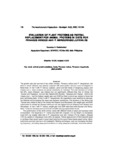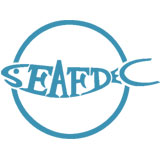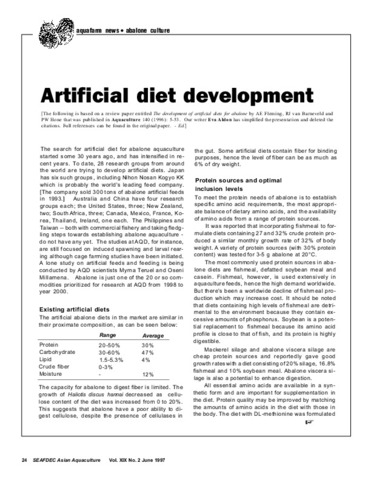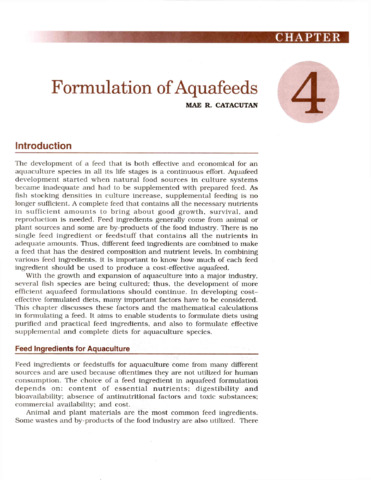Evaluation of plant proteins as partial replacement for animal proteins in diets for Penaeus indicus and P. merguiensis juveniles
Share
Abstract
The growth rate and survival of two white shrimps, Penaeus indicus and P. merguiensis, fed diets in which fishmeal was partially replaced with plant protein sources were investigated in three trials. In trial 1 with P. indicus, soybean, yeast and leaf meals of kangkong, papaya and Cassia tora L. were screened as partial substitutes for fishmeal. The total biomass of shrimp fed 20% yeast (20yeast) was highest but not significantly different than that of shrimp fed 10yeast and 10papaya. Survival was highest with 20yeast, 10papaya and 10yeast. Shrimp fed Cassia tora L. had the highest weight gain and SGR but their survival was similar to those fed poor performing diets. In trial 2 with P. merguiensis, the ingredients were modified by decreasing fishmeal and increasing the yeast and soybean substitution. The biomass of the shrimp fed 10 yeast was similar to that of the shrimp fed 20yeast and 26 soybean, the weight gain and SGR were similar to shrimp fed 20yeast while survival was highest but not different from 20yeast and 26 soybean. In trial 3 with P. indicus, weight gain and SGR were best with 20yeast and 34soybean. However, biomass and survival did not differ among replacement levels.
The performance of the white shrimp varied with different levels of yeast and soybean meal incorporation. The response of P. indicus was best with 20yeast (15% by weight) or 34soybean meal (34% by weight) while that of P. merguiensis was with 10yeast (7% by weight), 20yeast (15% by weight) or 26soybean meal (26% by weight). Partial replacement of fishmeal with yeast or soybean meal would result in lower feed costs but the use of these feeds needs further refinement since survival was low in all treatments. Rearing techniques, such as increasing the feeding frequency, simulating deep pond conditions or using adequate substrates, should be refined.
Suggested Citation
Peñaflorida, V. D. (2002). Evaluation of plant proteins as partial replacement for animal proteins in diets for Penaeus indicus and P. merguiensis juveniles. The Israeli Journal of Aquaculture-Bamidgeh , 54(3), 116-124. http://hdl.handle.net/10862/1943
Subject
aquaculture techniques; costs; diet; feed composition; feeding experiments; fishmeal; leaves; proteins; feeds; rearing techniques; shrimp culture; yeasts; yields; pelleted feeds; Carica papaya; Glycine max; Penaeus indicus; Senna obtusifolia; soybean meal; soybeans; Animal protein substitues; Plant proteins
Taxonomic term
Collections
- AQD Journal Articles [1249]
Related items
Showing items related by title, author, creator and subject.
-
Evaluation of various protein sources for Penaeus monodon postlarvae
Lim, Chhorn; Suraniranat, Prawit; Platon, Rolando R. (University of the Philippines, Los Baños, 1979)Penaeus monodon postlarvae with an average weight of 15.61 mg each were fed fresh brown mussel meat and artificial diets containing casein, shrimp meal, squid meal and Spirulina as protein sources at a daily rate of 20 per ... -
Artificial diet development [for abalone]
Aldon, Eva (Aquaculture Department, Southeast Asian Fisheries Development Center, 1997) -
Formulation of aquafeeds
Catacutan, Mae R. (Aquaculture Department, Southeast Asian Fisheries Development Center, 2002)The development of a feed that is both effective and economical for an aquaculture species in all its life stages is a continuous effort. Aquafeed development started when natural food sources in culture systems became ...




